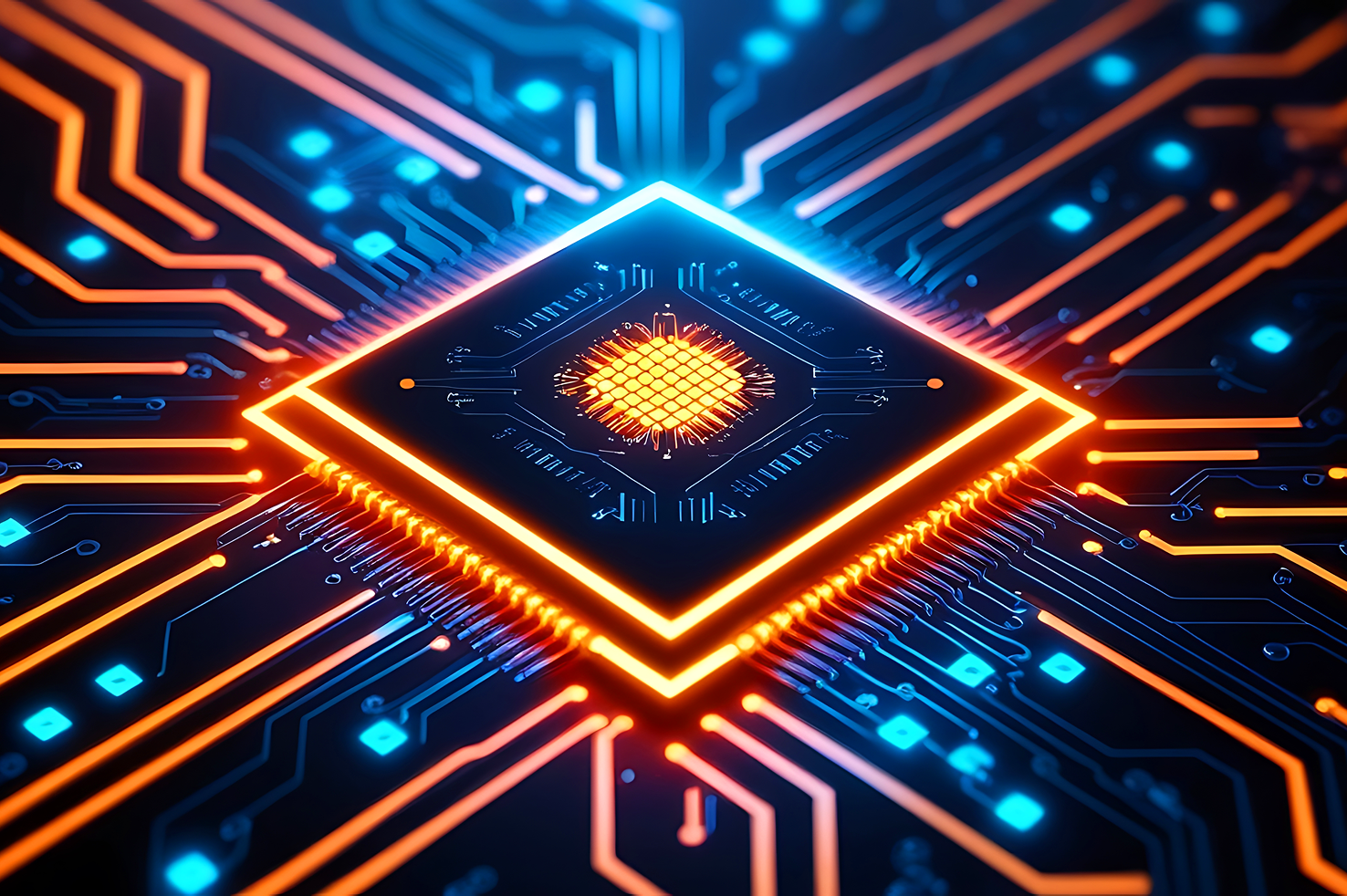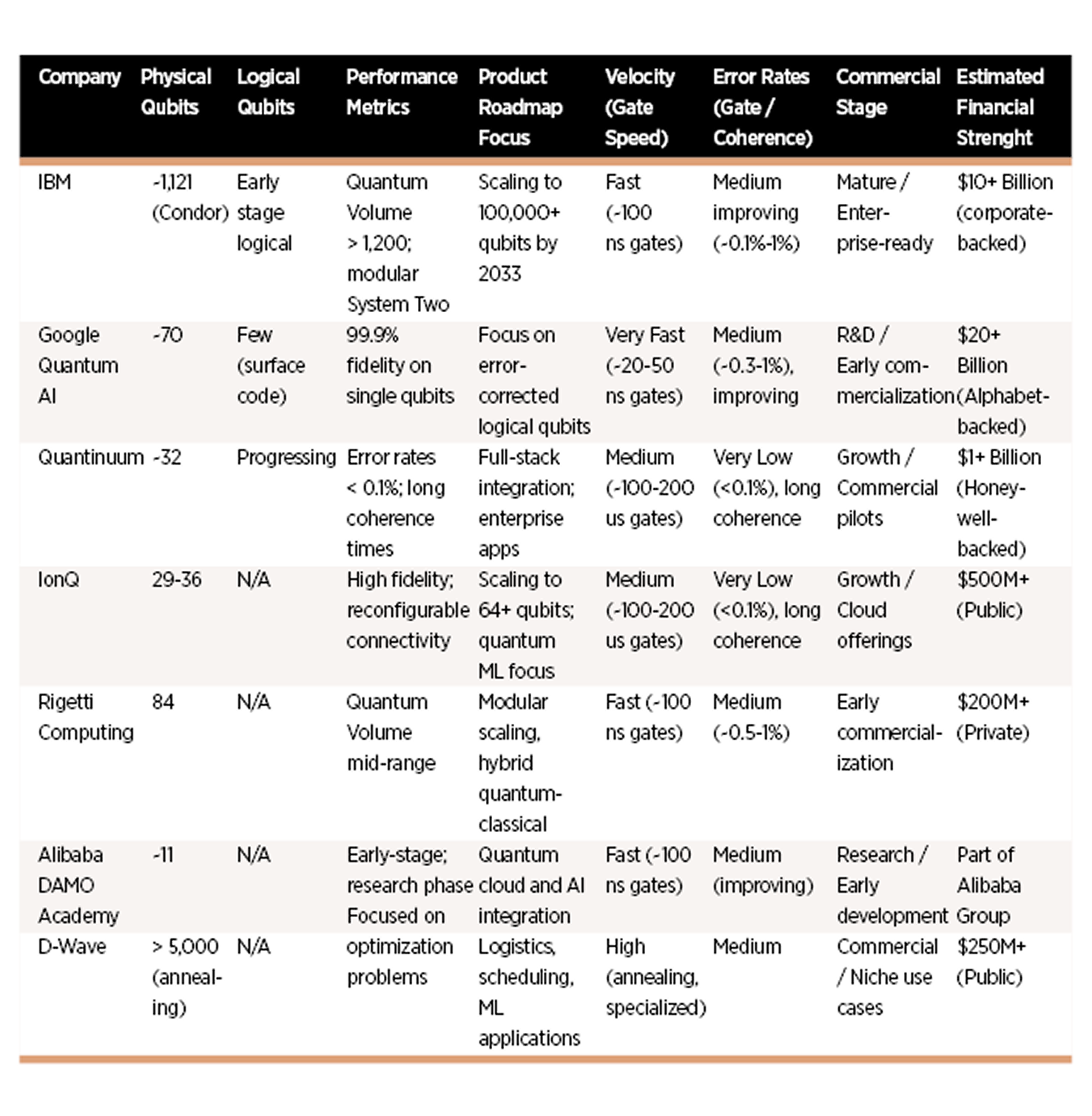Quantum computing stands poised to redefine the limits of computation by leveraging the unique and powerful principles of quantum mechanics. With the capability to perform specific calculations exponentially faster than classical computers, quantum technologies are set to transform industries such as finance, healthcare, energy, and cybersecurity.
As we progress through the 2020s, competition is intensifying among private enterprises, technology giants, and government-funded initiatives to achieve quantum advantage — the milestone at which quantum computers surpass classical systems in solving practical problems.
In the U.S., many of the leading quantum hardware and software advances come from private companies: Google, IBM, Microsoft, IonQ, Quantinuum, etc. These firms often have access to deep capital, partnerships with government labs, and ability to recruit global talent.
China has made quantum science and technology a strategic priority. There is coordinated funding, research institutions, national labs, state-backed firms, and strategic programs (e.g. for quantum communication, satellites, quantum networks). China arguably leads the world in quantum communication and quantum key distribution. Examples:
● The Micius satellite (Quantum Experiments at Space Scale) that enables quantum communication from space.
● Long-distance quantum-secured communication and “trunk lines” (e.g. Beijing-Shanghai quantum trunk line) for secure classical and quantum communication.
● Zuchongzhi 3.0: A superconducting quantum computer prototype with 105 readable qubits and 182 couplers. It achieves quantum random circuit sampling tasks far faster than the world’s most powerful classical supercomputers, and a reportedly huge speed-up compared to some of Google’s recent results.
● Tianyan-504 and “Xiaohong” superconducting chips: China has developed a 504-qubit superconducting chip and is working on higher qubit numbers and integration & control systems.
| QUANTUM COMPUTING: THE FUNDAMENTALS
Unlike classical computers that rely on bits with binary states of 0 or 1, quantum computers utilize qubits, which can exist in superpositions of both states simultaneously. This, combined with phenomena such as entanglement (the correlation between qubits regardless of distance) and quantum interference, allows quantum processors to evaluate a vast array of possibilities concurrently.
Nonetheless, developing scalable, fault-tolerant quantum computers remains a formidable challenge, hindered by issues including qubit stability (coherence time), error correction, scalability constraints, and stringent cooling requirements.
| A BRIEF HISTORY AND EVOLUTION OF QUANTUM COMPUTING
The evolution of quantum computing spans over four decades, transitioning from theoretical foundations to experimental prototypes and emerging commercial systems:
● 1980s – Theoretical Foundations
Physicist Richard Feynman proposed that simulating quantum systems would necessitate quantum computers. In 1985, David Deutsch at Oxford introduced the first general model for a quantum computer.
● 1990s – Early Algorithms
Peter Shor's 1994 factoring algorithm demonstrated the potential of quantum computing to break RSA encryption, while Lov Grover's 1996 search algorithm revealed quantum speedups for unstructured problems.
● 2000s – Proof-of-Concept Machines
Small-scale devices using nuclear magnetic resonance (NMR) and trapped ions validated fundamental qubit control and entanglement.
"In the U.S., many of the leading quantum hardware and software advances come from private companies: Google, IBM, Microsoft, IonQ, Quantinuum, etc. These firms often have access to deep capital, partnerships with government labs, and ability to recruit global talent"

● Future Outlook – Toward Fault-Tolerant, Industry-Ready Systems
The current race centers on constructing scalable quantum processors featuring thousands, and eventually millions, of logical qubits to reliably address commercially valuable problems.
| QUANTUM COMPUTING MARKET OPPORTUNITY
● McKinsey & Company (2025 Perspective)
Estimates the quantum computing market to reach $65 billion to $85 billion by 2030, encompassing hardware, software, services, and cloud access.
● Other Industry Projections
Analysts from BCG, Deloitte, and IDC anticipate the quantum market surpassing $100 billion by 2030, driven by quantum-enabled innovations across pharmaceuticals, finance, energy, materials, logistics, and artificial intelligence. PwC’s 2024 global technology forecast suggests quantum technologies could contribute over $120 billion annually by the early 2030s as adoption accelerates.
● Adjacent Markets
Quantum-inspired classical computing and post-quantum cryptography significantly broaden the total addressable market (TAM). The cybersecurity sector alone could generate tens of billions of dollars in revenue over the next decade due to the growing demand for quantum-safe technologies.
● Long-Term Outlook
Beyond 2030, experts envision a multi-hundred-billion-dollar quantum economy fueled by new industries, substantial optimization gains, and breakthroughs in fault-tolerant quantum computing. Some projections estimate the quantum-enabled economic impact could reach $500 billion to $1 trillion by 2040, contingent upon technological advancements.
| ENERGY CONSIDERATIONS IN QUANTUM COMPUTING
An often-overlooked aspect of quantum computing is its energy consumption profile. Unlike classical supercomputers that demand vast data centers with high power loads, quantum systems have distinctive energy requirements, primarily driven by:
● Cooling and Cryogenics
Most quantum computers operate at temperatures near absolute zero (millikelvin range) using dilution refrigerators, which require continuous power consumption in the order of thousands of watts, primarily for cooling infrastructure rather than computation itself.

● Qubit Control Electronics
The operation and readout of qubits involve microwave electronics and sophisticated laser systems (especially for trapped-ion qubits), contributing additional but comparatively lower power consumption.
● Efficiency Potential
Despite substantial cooling overhead, quantum computations addressing complex problems can be exponentially more energy-efficient than classical supercomputers that may run for days or weeks using megawatts of power.
● Future Developments
Ongoing research aims to improve cooling efficiency, extend qubit coherence times (thereby reducing redundant computations), and develop room-temperature quantum devices, such as photonic quantum computers, which could dramatically reduce energy consumption.
In summary, while current quantum hardware demands considerable energy primarily for cooling, the promise of significantly faster computations for specific applications offers potential for long-term energy savings and environmental benefits.
| LEADING PLAYERS IN QUANTUM COMPUTING
Several companies have emerged as leaders, each adopting distinct hardware architectures and commercialization strategies: IBM, Google Quantum AI, Quantinuum, IonQ, Rigetti Computing, Alibaba DAMO Academy, D-Wave (see Chart 01).

| QUANTINUUM: A STANDOUT CONTENDER
Quantinuum distinguishes itself through the integration of high-fidelity trapped-ion hardware and advanced quantum software. This full-stack approach accelerates progress in error correction and fault tolerance, surpassing competitors that focus solely on hardware or software.
● Trapped-ion qubits with error rates below 0.1% and long coherence times enable more stable quantum computations than most superconducting systems.
● Formed from the merger of Honeywell Quantum Solutions and Cambridge Quantum, the company leverages deep expertise in hardware engineering and quantum algorithms.
● Strategic partnerships, including with Microsoft Azure Quantum, facilitate enterprise deployment.
● Supported by Honeywell’s strong financial backing, ensuring sustained research and development investment.
| INDUSTRIES POISED FOR QUANTUM DISRUPTION
Quantum computing’s transformative potential lies in solving problems currently intractable for classical systems. The industries most likely to experience early and profound impacts include:
1 Financial Services
Real-time portfolio optimization, high-frequency trading analysis, and post-quantum cryptography to secure against emerging threats.
2 Healthcare & Life Sciences
Accelerated drug discovery via precise molecular simulation, protein folding solutions for complex diseases, and genomics-driven personalized medicine.
3 Manufacturing & Supply Chain
Quantum-assisted process optimization, predictive maintenance, and global logistics optimization under disruptive scenarios.

4 Energy & Climate
Discovery of novel battery materials, grid balancing for renewable energy integration, and enhanced carbon capture technologies.
5 Cryptography & Cybersecurity
Breaking vulnerable encryption protocols, deploying quantum-safe cryptography, and leveraging quantum key distribution (QKD) for secure communications.
6 Transportation & Logistics
Optimization of airline and shipping routes, urban traffic simulations to reduce congestion, and aerospace design improvements.
7 Artificial Intelligence
Quantum machine learning for faster training, ultra-sensitive pattern recognition, and synergistic AI-quantum applications across sectors.
| BENEFITS OF QUANTUM COMPUTING FOR HUMANITY
Quantum computing promises to unlock solutions to some of humanity’s most critical challenges and enable innovations beyond current imagination:
● Accelerating Scientific Discovery
Enabling unprecedented precision in simulating natural processes, leading to breakthroughs in materials science, drug development, and energy research.
● Enhancing Global Security
Strengthening cybersecurity frameworks through quantum-safe technologies to safeguard communications and financial transactions.
● Promoting Sustainable Development
Optimizing energy use, improving resource management, and modeling climate change scenarios to combat global warming.
● Advancing Healthcare Outcomes
Facilitating faster drug discovery and personalized treatments that improve quality and longevity of life worldwide.
● Driving Economic Growth
Creating new industries, improving operational efficiencies, and generating significant economic value and employment.
● Empowering Education and Research
Democratizing access to quantum technologies to cultivate a new generation of innovators and scientists.
| WHAT TO WATCH GOING FORWARD
To see how the competition develops, some key indicators will tell us more:
● Fault-tolerant, error-corrected quantum hardware: When either country can reliably build quantum computers with many logical qubits (i.e. after error correction) that can solve meaningful class of problems, that will be a big inflection.
● Commercial & real-world applications: Quantum chemistry, optimization, sensing, etc., especially if deployed at scale.
● Quantum internet & secure networks: Whether there emerges a globally robust quantum communication infrastructure.
"Quantinuum distinguishes itself through the integration of high-fidelity trapped-ion hardware and advanced quantum software. This full-stack approach accelerates progress in error correction and fault tolerance, surpassing competitors that focus solely on hardware or software"

● Standards, interoperability, regulation: Who leads in setting global norms (crypto, communication, safety, etc.).
● Talent, education, supply chain resilience: Who can maintain and attract the needed workforce, control needed materials, etc.
● National security deployment: For encryption, sensing, defense – governments will care a lot about who has practical advantage in these domains.
| THE ROAD AHEAD
The pursuit of practical quantum advantage extends beyond speed to encompass reliability, scalability, and commercial relevance. Success will hinge on breakthroughs in hardware, algorithms, software platforms, and error correction. The frontrunners will be those who achieve full-stack integration, effectively bridging raw quantum capabilities with real-world applications and business solutions.
This race transcends mere technology—it’s about who builds the architecture of tomorrow’s world. Quantum supremacy promises transformative effects in medicine, secure communication, AI, financial systems, and national security. Quantum technology isn't merely a scientific curiosity—it stands to redefine national defense through ultra-secure communications, navigational independence, unprecedented detection capabilities, and computational superiority. As quantum systems advance, they promise to both empower nations and challenge existing security paradigms.
China is making striking breakthroughs in hardware benchmarks and in quantum communication / secure networks. On certain “speed” or “scale” metrics, it appears to be ahead of many rivals. The U.S., while perhaps slightly behind in some of those headline metrics, maintains strength in breadth: diversified architectures, stronger private ecosystem, more mature commercialization, robust research institutions, and depth in error correction & applied quantum software.
The race is far from over. Leadership might shift depending on who solves the more difficult technical challenges next, how fast commercial uses arrive, and how well each country sustains investment, talent, and strategy over time.

ChatGPT
Developed by OpenAI, ChatGPT is a generative artificial intelligence (AI) chatbot launched in 2022.
chatgpt.com




